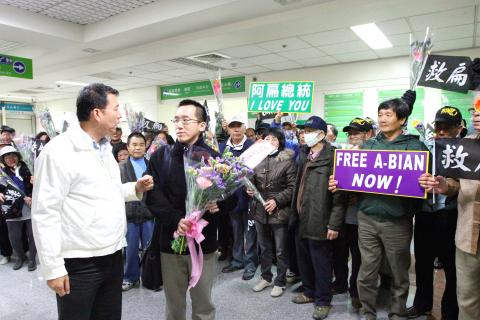Former president Chen Shui-bian (陳水扁) has requested that prison authorities explain why he was given psychiatric medication when he had not asked to see a psychiatrist, Chen’s office secretary Chiang Chih-ming (江志銘) yesterday.
Chen Chih-chung (陳致中), Chen Shui-bian’s son, said the medical team at the government-run Taoyuan General Hospital discovered a drug normally used to treat psychiatric conditions in the former president’s list of medications.
Chen Chih-chung, as well as Chiang and members of pro-localization groups, demanded that Taipei Prison explain why the medication was given to the former president, who is serving a 17-and-a-half-year prison sentence for corruption.

Photo: Li Jung-ping, Taipei Times
Chen Shui-bian underwent cardiac catheterization on Thursday to treat acute coronary syndrome. Doctors subsequently said the syndrome could be cured by medication rather than inserting stents.
To draw a more complete picture of the former president’s medical history, Taoyuan General Hospital asked Chen Shui-bian to bring with him a list of past medications received, among which was the psychiatric medication the team caring for Chen Shui-bian found.
Chen Chih-chung questioned the motives behind the decision by doctors at Taipei Prison to prescribe his father such medication, adding that his father did not know about the drugs, nor had he ever asked to see a psychiatrist.
“What is this psychiatric medication used for and why was it given to my father?” Chen Chih-chung asked.
Former vice president Annette Lu (呂秀蓮) said the drug allegedly given to the former president was Ativan, which is usually used to treat anxiety.
Chen Chih-chung said his father had trouble breathing last night and was given a breathing mask, adding that doctors were trying to determine whether the symptoms were related to cardiopulmonary problems.
Pro-independence groups added their voices to the call for an explanation.
Taiwan Hakka Society chairman Chang Yeh-sen (張葉森) said doctors who prescribe medicine are obligated to tell patients what is being prescribed, adding the prison should provide an explanation.
If the prison doctors prescribed psychiatric medication to the former president without telling him, then it would go against the principles of modern healthcare, Chang said.
“Chen Shui-bian has always been strong-willed and very energetic, but recently he’s not looking so well and he’s slightly lethargic,” Chang said, as he questioned whether Chen Shui-bian’s deteriorating health and stress problems are products of his prolonged confinement.
The Chinese-language United Daily News reported on Wednesday that Chen Chih-chung had attributed his father’s acute coronary syndrome to lack of exercise and long-time confinement in cramped quarters.
Minister of Justice Tseng Yung-fu (曾勇夫) said Chen Shui-bian was not denied his daily 30-minute exercise and that the former president was barred from working in factories with his fellow inmates because of security reasons as well as respect for a former head of state.
However, Chen Chih-chung said the prison’s actions were “infringing on my father’s human rights; it’s inhumane and unjust.”
Responding to Chen Chih-chung’s claims, Taipei Prison warden Fang Tzu-chieh (方子傑) said the prison doctors are on secondment from Taoyuan General Hospital, adding: “When Chen Shui-bian catches a cold, the medication prescribed comes from the hospital.”
“The prison is uncertain of the contents of the medication and we respect the professionalism of the doctors, so we do not ask,” Fang said.

The Taiwanese passport ranked 33rd in a global listing of passports by convenience this month, rising three places from last month’s ranking, but matching its position in January last year. The Henley Passport Index, an international ranking of passports by the number of designations its holder can travel to without a visa, showed that the Taiwan passport enables holders to travel to 139 countries and territories without a visa. Singapore’s passport was ranked the most powerful with visa-free access to 192 destinations out of 227, according to the index published on Tuesday by UK-based migration investment consultancy firm Henley and Partners. Japan’s and

NATIONAL SECURITY THREAT: An official said that Guan Guan’s comments had gone beyond the threshold of free speech, as she advocated for the destruction of the ROC China-born media influencer Guan Guan’s (關關) residency permit has been revoked for repeatedly posting pro-China content that threatens national security, the National Immigration Agency said yesterday. Guan Guan has said many controversial things in her videos posted to Douyin (抖音), including “the red flag will soon be painted all over Taiwan” and “Taiwan is an inseparable part of China,” while expressing hope for expedited “reunification.” The agency received multiple reports alleging that Guan Guan had advocated for armed reunification last year. After investigating, the agency last month issued a notice requiring her to appear and account for her actions. Guan Guan appeared as required,

Japan and the Philippines yesterday signed a defense pact that would allow the tax-free provision of ammunition, fuel, food and other necessities when their forces stage joint training to boost deterrence against China’s growing aggression in the region and to bolster their preparation for natural disasters. Japan has faced increasing political, trade and security tensions with China, which was angered by Japanese Prime Minister Sanae Takaichi’s remark that a Chinese attack on Taiwan would be a survival-threatening situation for Japan, triggering a military response. Japan and the Philippines have also had separate territorial conflicts with Beijing in the East and South China

A strong cold air mass is expected to arrive tonight, bringing a change in weather and a drop in temperature, the Central Weather Administration (CWA) said. The coldest time would be early on Thursday morning, with temperatures in some areas dipping as low as 8°C, it said. Daytime highs yesterday were 22°C to 24°C in northern and eastern Taiwan, and about 25°C to 28°C in the central and southern regions, it said. However, nighttime lows would dip to about 15°C to 16°C in central and northern Taiwan as well as the northeast, and 17°C to 19°C elsewhere, it said. Tropical Storm Nokaen, currently